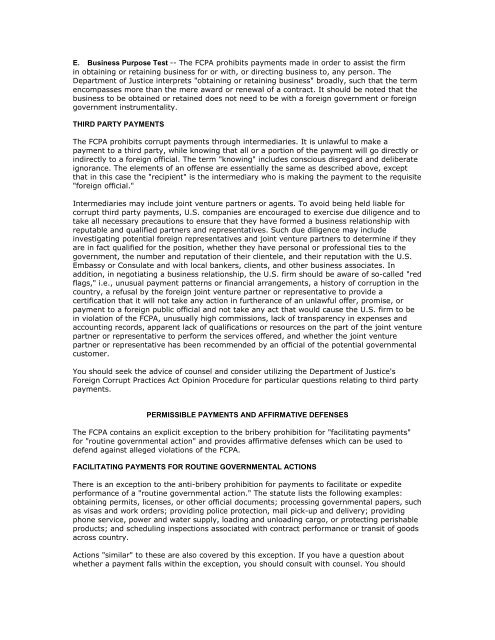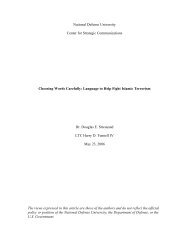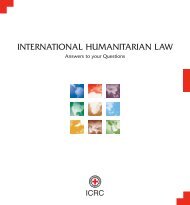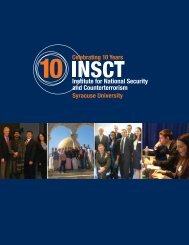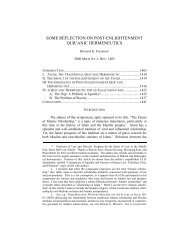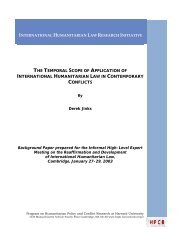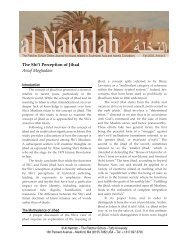A Lay Person's Guide to the FCPA - insct
A Lay Person's Guide to the FCPA - insct
A Lay Person's Guide to the FCPA - insct
You also want an ePaper? Increase the reach of your titles
YUMPU automatically turns print PDFs into web optimized ePapers that Google loves.
E. Business Purpose Test -- The <strong>FCPA</strong> prohibits payments made in order <strong>to</strong> assist <strong>the</strong> firmin obtaining or retaining business for or with, or directing business <strong>to</strong>, any person. TheDepartment of Justice interprets "obtaining or retaining business" broadly, such that <strong>the</strong> termencompasses more than <strong>the</strong> mere award or renewal of a contract. It should be noted that <strong>the</strong>business <strong>to</strong> be obtained or retained does not need <strong>to</strong> be with a foreign government or foreigngovernment instrumentality.THIRD PARTY PAYMENTSThe <strong>FCPA</strong> prohibits corrupt payments through intermediaries. It is unlawful <strong>to</strong> make apayment <strong>to</strong> a third party, while knowing that all or a portion of <strong>the</strong> payment will go directly orindirectly <strong>to</strong> a foreign official. The term "knowing" includes conscious disregard and deliberateignorance. The elements of an offense are essentially <strong>the</strong> same as described above, exceptthat in this case <strong>the</strong> "recipient" is <strong>the</strong> intermediary who is making <strong>the</strong> payment <strong>to</strong> <strong>the</strong> requisite"foreign official."Intermediaries may include joint venture partners or agents. To avoid being held liable forcorrupt third party payments, U.S. companies are encouraged <strong>to</strong> exercise due diligence and <strong>to</strong>take all necessary precautions <strong>to</strong> ensure that <strong>the</strong>y have formed a business relationship withreputable and qualified partners and representatives. Such due diligence may includeinvestigating potential foreign representatives and joint venture partners <strong>to</strong> determine if <strong>the</strong>yare in fact qualified for <strong>the</strong> position, whe<strong>the</strong>r <strong>the</strong>y have personal or professional ties <strong>to</strong> <strong>the</strong>government, <strong>the</strong> number and reputation of <strong>the</strong>ir clientele, and <strong>the</strong>ir reputation with <strong>the</strong> U.S.Embassy or Consulate and with local bankers, clients, and o<strong>the</strong>r business associates. Inaddition, in negotiating a business relationship, <strong>the</strong> U.S. firm should be aware of so-called "redflags," i.e., unusual payment patterns or financial arrangements, a his<strong>to</strong>ry of corruption in <strong>the</strong>country, a refusal by <strong>the</strong> foreign joint venture partner or representative <strong>to</strong> provide acertification that it will not take any action in fur<strong>the</strong>rance of an unlawful offer, promise, orpayment <strong>to</strong> a foreign public official and not take any act that would cause <strong>the</strong> U.S. firm <strong>to</strong> bein violation of <strong>the</strong> <strong>FCPA</strong>, unusually high commissions, lack of transparency in expenses andaccounting records, apparent lack of qualifications or resources on <strong>the</strong> part of <strong>the</strong> joint venturepartner or representative <strong>to</strong> perform <strong>the</strong> services offered, and whe<strong>the</strong>r <strong>the</strong> joint venturepartner or representative has been recommended by an official of <strong>the</strong> potential governmentalcus<strong>to</strong>mer.You should seek <strong>the</strong> advice of counsel and consider utilizing <strong>the</strong> Department of Justice'sForeign Corrupt Practices Act Opinion Procedure for particular questions relating <strong>to</strong> third partypayments.PERMISSIBLE PAYMENTS AND AFFIRMATIVE DEFENSESThe <strong>FCPA</strong> contains an explicit exception <strong>to</strong> <strong>the</strong> bribery prohibition for "facilitating payments"for "routine governmental action" and provides affirmative defenses which can be used <strong>to</strong>defend against alleged violations of <strong>the</strong> <strong>FCPA</strong>.FACILITATING PAYMENTS FOR ROUTINE GOVERNMENTAL ACTIONSThere is an exception <strong>to</strong> <strong>the</strong> anti-bribery prohibition for payments <strong>to</strong> facilitate or expediteperformance of a "routine governmental action." The statute lists <strong>the</strong> following examples:obtaining permits, licenses, or o<strong>the</strong>r official documents; processing governmental papers, suchas visas and work orders; providing police protection, mail pick-up and delivery; providingphone service, power and water supply, loading and unloading cargo, or protecting perishableproducts; and scheduling inspections associated with contract performance or transit of goodsacross country.Actions "similar" <strong>to</strong> <strong>the</strong>se are also covered by this exception. If you have a question aboutwhe<strong>the</strong>r a payment falls within <strong>the</strong> exception, you should consult with counsel. You should


